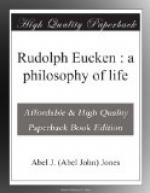One of the theories of knowledge that springs from laying emphasis upon life and action is that of Pragmatism, of which the late Professor William James was one of the greatest exponents. Pragmatists contend that the test of truth is its value for life—if the fact obtained is the most useful and helpful for life, then it is the true one. Suppose we are endeavouring to solve the great question, “Is there a God?” We weigh the arguments for and against, but find it difficult to arrive at a definite conclusion, because the arguments on both sides seem equally plausible. How are we to decide? We cannot postpone the decision indefinitely—we are forced to make a choice, for upon our decision depends our aim and ideals in life. We are faced with a “forced option,” and must choose one or the other. We ask ourselves the question, “Which will be of the greatest help to our lives—to believe that there is, or that there is not a God?” and we decide or will to believe the option that will help life most. It is a striking theory, but space forbids our discussing it in detail.
The position Eucken adopts is that of Activism. In common with pragmatism it makes truth a matter of life and action rather than of mere intellect, and considers fruitfulness for action a characteristic of truth. He differs from the pragmatic position in that he contends that truth is something deeper than mere human decision, that truth is truth, not merely because it is useful, that reality is independent of our experience of it, and that truth is gained intuitively through a life of action.




